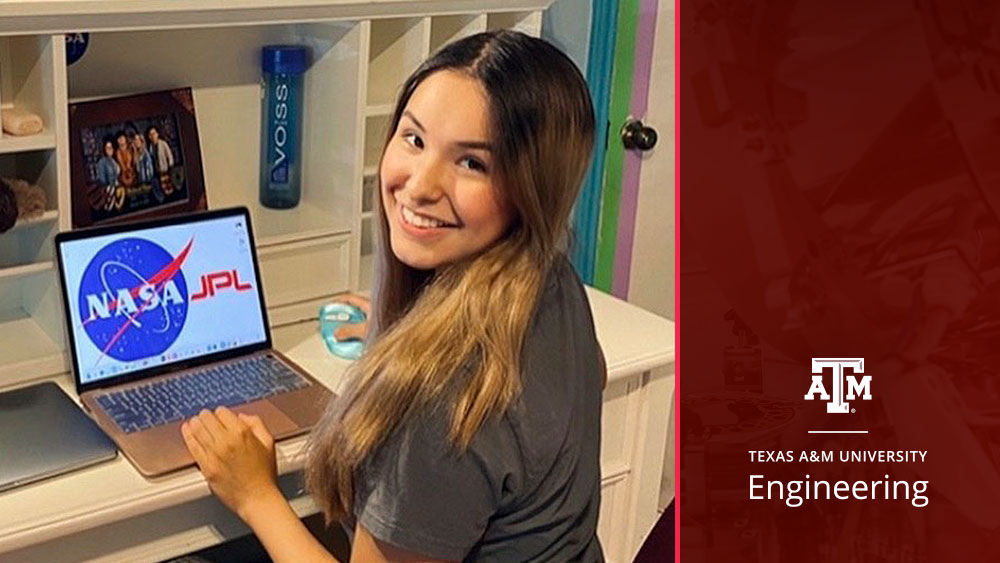
For Andrea Rivera, a student in the Department of Aerospace Engineering at Texas A&M University, landing her first NASA internship felt like the epitome of the American dream. She had spent the first eight years of her life growing up in Peru and speaking only Spanish. From the time she immigrated to the U.S. at the age of 8, her family — especially her dad — instilled in her the value of hard work and knowledge.
“When I was little, my dad never helped with any homework,” said Rivera. “He would challenge me and my brother to find the answer ourselves, teaching us that knowledge is at our fingertips. He has always built this curiosity in us, and as cheesy as it is, we love learning now.”
She also remembers her dad putting on “Cosmos: A Spacetime Odyssey” for them to watch during family time, which first sparked her interest in aerospace. Kindling that spark, her uncle often brought telescopes to their house and explained constellations, entertaining her questions about the stars and planets. By high school, Rivera had gravitated toward STEM (science, technology, engineering and mathematics) and participated in robotics all four years.
"I came here not knowing any English, so I faced some struggles in school," she said. “I think I’ve always loved math because even if I didn’t know how to speak English, it was the same in any language."
Her love for STEM led her to Texas A&M and helped her find community with Texas A&M’s chapter of the Society of Hispanic Professional Engineers (SHPE). During her sophomore year, she won top lead engineer in a 24-hour engineering challenge at SHPE’s annual national convention. This title gave her the confidence boost she needed to put herself out there at the convention’s career fair and apply for a NASA internship.
“When I got my internship, it was just the perfect full-circle moment of all my hard work,” said Rivera. “I’m a Hispanic woman in STEM, so there are some challenges to that. Now in my junior year, I’ve finished two internships at NASA and worked on something that’s going to launch into space.”
During her first NASA internship, Rivera worked on surface operations for the Mars 2020 mission, testing the capabilities of the Planetary Instrument for X-ray Lithochemistry (PIXL) mounted on the Perseverance Rover.
"The whole point of the mission is to help the human exploration astrobiology concept," she said. "It's to see if we can find elements that indicate past life on Mars that can then help us here on Earth to figure out the beginnings of planets and if they're habitable."
Specifically, Rivera's work at NASA has been in verification and validation, which is the testing process to ensure that system requirements are met and that the system can fulfill its purpose. Fortunately, much of this work can be done virtually.
"I was doing different testing procedures with PIXL, but I was doing it in a virtual flight software environment that simulates the real flight software," said Rivera. "I tested different procedures for the instrument from the comfort of my own home, making sure that it's answering correctly as it would on Mars."
After her first internship concluded, she was invited back to be a systems engineer intern on the Psyche mission, which is scheduled to launch in fall 2022.
"With Psyche, we're trying to analyze the early creations of planets," said Rivera. "Psyche, this asteroid, is exposed to a nickel, iron core, and scientists believe that it could be the beginning of our solar system."
In addition to the work experience she gained in her internships, the mentors she has found in the renowned NASA engineers and scientists she’s worked with have been another invaluable part of her involvement with NASA.
"I never saw people like me before, and you want to have role models in the career you want to do," said Rivera. "Now, I found some at NASA, and women in STEM are on the come-up."
She aspires to be one of those leaders in the industry someday. Right now, she's focused on helping other minority students reach their goals by tutoring, being a role model in her organizations and helping her peers find internship opportunities.
"I want everyone to succeed, and I'm trying to pave the way not only for younger kids, but for my siblings," she said. "I'm going to be the first engineer in my family, and that was something that I never thought I could do."
Looking ahead, she plans to pursue a master's degree to help drive her toward becoming a leader in the aerospace industry.
"I truly love what I'm doing," she said. "And I hope that I end up someplace like NASA, creating and helping in these history-changing projects."